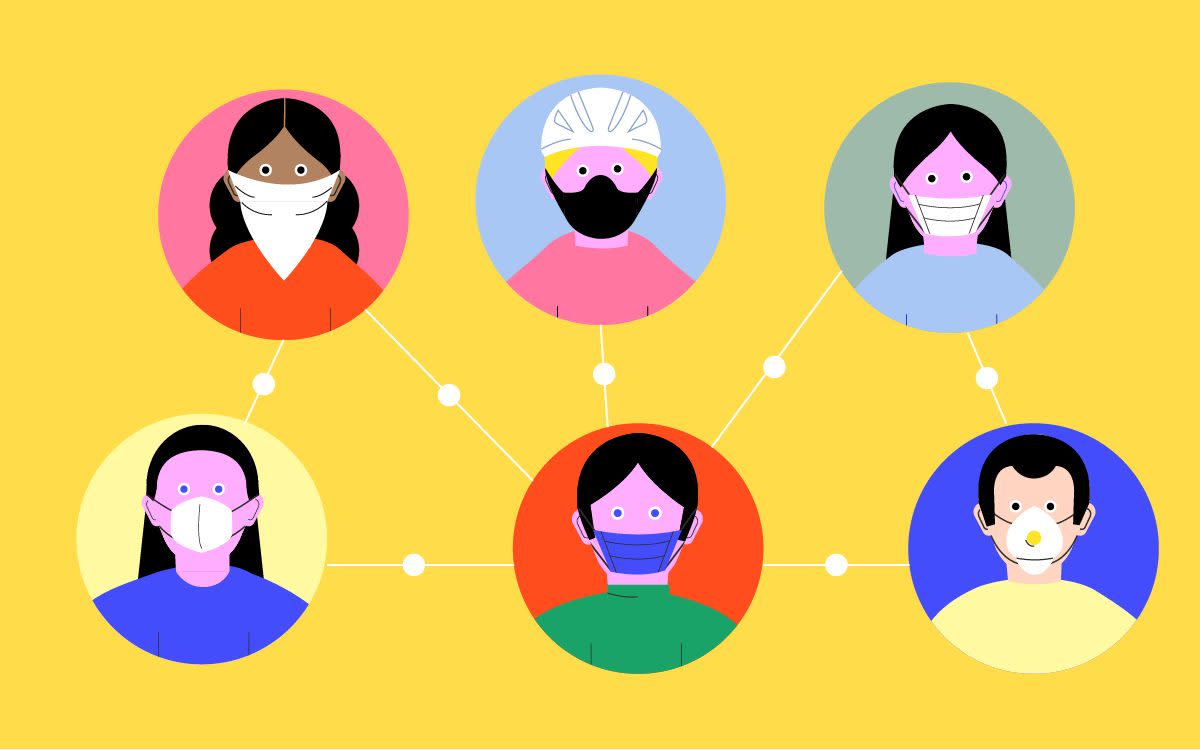New face mask rules: Where are coverings mandatory?

- Oops!Something went wrong.Please try again later.
Mandatory mask-wearing will return to shops and public transport in England this week, as the Government takes action to try to tackle the omicron coronavirus variant that has arrived in the UK.
The rules surrounding face masks were relaxed in England in July. The change was announced by Boris Johnson at a Downing Street press conference on Saturday, Nov 27, after omicron cases were confirmed in Nottinghamshire and Brentwood, Essex.
Sajid Javid, the Health Secretary, gave more detail on Sunday, Nov 28, when he said the masks rule would apply from 4am on Tuesday and would bring England closer into line with Scotland, Wales and Northern Ireland.
Fines of £200 will be handed out to people in England who fail to wear masks on public transport and in shops. The fines will double with every offence, rising to £400 for a second infraction and £800 for a third, up to a maximum of £6,400.
Do we still have to wear masks in pubs and restaurants?
The Prime Minister said on Nov 27 that hospitality would be exempt from the rule change, and further details would be outlined by the Health Secretary "in the course of the next day or so".
Who is exempt from wearing a face mask?
The official government web page for masks had not been updated by Nov 27 to take account of the latest change, but it still states the following groups are exempt from wearing a mask:
children under the age of 11 (Public Health England does not recommend face coverings for children under the age of three, for health and safety reasons)
people who cannot put on, wear or remove a face covering because of a physical or mental illness or impairment, or disability
where the putting on, wearing or removing a face covering will cause severe distress
instances where people are speaking to or providing assistance to someone who relies on lip reading, clear sound or facial expressions to communicate
to avoid harm or injury, or the risk of harm or injury, to yourself or others
police officers and other emergency workers – this may interfere with their ability to serve the public
What's the reaction to the decision?
Mick Lynch, the general secretary of the Rail, Maritime and Transport union, said: "We support the wearing of masks but there are major issues about enforcement and it is our members left in the front line with angry passengers who refuse to comply. The Government must make the resources available to police this reintroduction of masks."
Bobby Morton, the Unite national officer for passenger transport, said: "It is not sufficient to announce that face masks will once again become compulsory, this policy has got to be fully enforced in order to protect public health.
"The Government's previous inconsistent messaging on face mask wearing is almost certainly going to result in a high degree of non-compliance.
"Unite's advice to bus drivers is clear: it is not their role to enforce mask wearing, their responsibility is to safely drive and operate the bus. The job of enforcing mask wearing is that of the bus operator and the police.
"Unite has consistently warned that the requirement to wear face masks should never have been removed while rates of Covid-19 remained high. It is only the arrival of the new variant which has forced the Government to act."
James Lowman, the chief executive of the Association of Convenience Stores, said: "We are helping retailers to prepare for the change in face covering rules, but they are extremely concerned about abuse against their staff from customers who don't want to wear a face covering in a shop.
"We will continue to urge stores to communicate the rules, but not to challenge those who refuse to abide by the rules."
What other Covid rules have changed?
Passengers arriving to the UK have been told that from Tuesday, Nov 30, they will have to take a PCR test for Covid-19, with the expectation they will have to self-isolate until they test negative.
All contacts of a suspected case of omicron will have to isolate for 10 days, regardless of their vaccination status.
To further slow the arrival of cases, ministers said Malawi, Mozambique, Zambia and Angola would face travel restrictions from Nov 28, when they will join South Africa and five other neighbouring nations on UK red lists.
Will more restrictions be brought in?
Speaking on Nov 28, Mr Javid said it was "nowhere near" the time to reintroduce social distancing rules and work-from-home guidance, and was hopeful the mask mandate would be removed "within weeks".
He said it "would be irresponsible to make guarantees" during the ever-changing pandemic, but told Sky's Trevor Phillips on Sunday: "I think people should continue with their plans as normal for Christmas, I think it's going to be a great Christmas."
When will the decision be reviewed?
Mr Johnson said the measures would be reviewed in three weeks - just days before Christmas - as he warned omicron appears to spread "very rapidly", can transmit between the double-vaccinated, and may partially reduce the protection offered by existing vaccines.
The UK, Germany and Italy all confirmed the presence of Omicron on Nov 27, a day after the variant - which was first detected in South Africa - was reported to be in Belgium.
Australia, Botswana, Denmark, Hong Kong, Israel, the Netherlands, France and Canada have all also reported cases.

